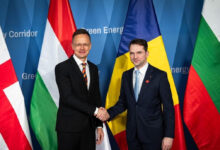Central European Natural Gas Congress in Sibiu
Transgaz Places Romania on the European Energy Scene
Transgaz organized during September 27-29, in Sibiu, the Central European Natural Gas Congress 2023, an event that brought together high-ranking officials from Romania and abroad, Romanian, and foreign energy experts, central and local government authorities, academics, media. The growing importance of Transgaz’s prestige at European level, supported by its management strategies, by the strategic investments made in the modernisation and development of the energy infrastructure, by its active participation in projects of regional and European interest and by dynamic partnerships with companies in the sector, was completed with the organisation of this event.
The meetings and debates that took place during the three days of the congress facilitated the exchange of information between energy sector specialists on topics of utmost interest, such as balanced and safe exploitation of gas reserves in Central, South-East Europe and the Balkans, geostrategic uncertainty on the European energy market, investment in national gas infrastructure – a driver for sustainable development of the local community, diversification of natural gas supply sources and transmission routes in Central, South-East Europe and the Balkans, strengthening European energy security, financing investments in the development of gas infrastructure in Central, South-East Europe and the Balkans, optimisation of energy industry processes through the use of new digital technologies, including the role of energy diplomacy in ensuring a sustainable future.
“It is a great honour for Transgaz, for my colleagues at Transgaz, for the whole area of gas exploitation, transmission, distribution, and supply, to have the license for this year to organize, here in Romania, the Central – European Natural Gas Congress. And it is not by chance that we chose the place where we organised it: Transylvania, because Transylvania is part of Central Europe. I would like to thank all the guests who accepted the invitation and participated in this congress, the ambassadors who made great efforts to travel from Bucharest to Sibiu, the other guests from the TSOs of Central Europe, the Balkans, Greece, Bulgaria, Hungary. I would like to thank all the partners who joined us in organising this event. I am glad that together we have managed to put Romania once again on the deserved place on the European scene as far as the energy sector is concerned,” General Manager of Transgaz Ion Sterian said in his opening remarks.
“Romania is in the best position in terms of security of gas supply”
Ion Sterian mentioned that “Romania is in the best position in terms of security of gas supply.”
Thus, thanks to the investments made by Depogaz, supported by Romgaz, the storage capacity has increased by 100 million cubic metres compared to the previous year, reaching 3.17 billion cubic metres. There are currently 3.065 billion cubic metres of gas in storage, by 477 million cubic metres more than at the same time last year, which means 96.23%, by 1.22% higher than the European average. In addition, storage withdrawal capacity has been increased.
Unfortunately, much of Romania’s gas consumption today goes to household activity. For example, today, with a consumption of 14.2 million cubic metres of gas, more than 80-90% is represented by household consumption. The General Manager of Transgaz gave the example of Spain, which has a similar transmission system to Romania, for comparison, where the ratio is 70% consumption for industry and 30% consumption for the population.
“A country without production is a country without a future”
Although Ion Sterian recalled the resumption of activity at Azomures, the largest producer of chemical fertilisers, as of October 1, as well as at other companies in the country, and also referred to Black Sea gas, he warned that “a country without production is a country without a future.”
“Black Sea gas will come, as OMV Petrom and Romgaz have stated, at the end of 2027. We have started building the infrastructure, work has started, we will complete it by 2025. We are on schedule with the works. But onshore gas production in Romania is declining and will continue to decline, according to our estimates, reaching by the end of 2027 – beginning of 2028 from today’s 9.2bcm, somewhere around 7bcm. Black Sea gas will not be enough – there are 8.2bcm signed with the OMV Petrom and Romgaz consortium – because we have the government program to connect localities to the gas network. There are a lot of tenders going on, a lot of works that have already started. Romania’s consumption will increase by another 2-3 billion cubic metres (…). On the other hand, we have to consider the part of production recovery. We have the Mintia power plant with a consumption of 2.5bcm of gas. Grant agreements have already been signed from the NRRP by CE Oltenia with gas-fired power plants at Isalnita and Turceni, with a gas consumption of 1.5bcm. There is also the Iernut power plant, which is in the final phase of completion with another 800mcm-1bcm, plus Azomures with 1.2-1.5bcm. If we say that production will be around 7bcm, another 8bcm from the Black Sea, we are talking about 15bcm,” Ion Sterian pointed out.
However, Romania will continue to import gas, the General Manager of Transgaz added. The company has set up the transmission infrastructure to bring Caspian Sea gas by pipelines through LNG terminals in Greece and Turkey from any corner of the globe and then onwards to Hungary, to the Republic of Moldova.
Another problem faced not only by Transgaz, but also by the other TSOs in the region, is that of funding.
“Together with my colleagues from other countries, we are fighting for funding with the European Commission, with DG Clima, with the European Investment Bank, who impose some aberrant and unjustified conditions. We have sent letters to Brussels, starting with the President of the European Commission, the Vice-President, to all the ministers from the group of EU countries that are part of the Modernisation Fund, plus the three neutral observers – the Netherlands, Sweden, and Germany. We are waiting to see what happens. Projects cannot be blocked because we have other funding solutions.”
Facilitating cooperation between European Transmission System Operators
As Transgaz’s representatives say, the topics discussed at Central European Natural Gas Congress 2023 have been chosen to cover all the important issues for the gas sector today, as well as for its medium- and long-term future, such as hydrogen. The central element of the topics is energy security, both from the perspective of diversification of supply sources and from the perspective of gas infrastructure development, so that collaboration between European Transmission System Operators is facilitated.
In the context of increasing energy security in gas supply at European level, diversification of gas supply sources and transmission routes are drivers for enhancing energy security and solidarity, and expertise and collaboration between European Transmission Operators becomes essential. Therefore, facilitating a framework for interaction at regional level was an opportunity to develop potential partnerships in the energy sector.
The venue was chosen with dual symbolism in mind: on the one hand, Sibiu was the city that put Romania on the European map several times, both when it was the European Capital of Culture and when it was the place that brought together European leaders when Romania held the rotating Presidency of the Council of the European Union, and on the other hand, it reminds us of the fact that the headquarters of Transgaz is located in Medias, Sibiu County, and that the first natural gas transmission pipeline in our country and in Europe was built in the centre of the country in 1914.
In 2022, the Central European Natural Gas Congress was hosted by Slovakia and held under the aegis of the Slovak Gas and Oil Association and under the patronage of Eustream, the Slovakian company that is Transgaz’s counterpart. Transgaz has been granted a licence to organise the Central European Natural Gas Congress and to use its name and logo for a period of 12 months starting with 1 July 2023.







